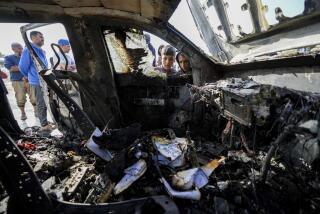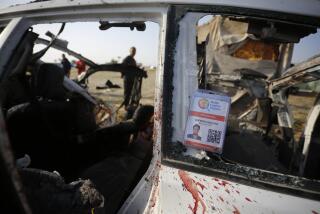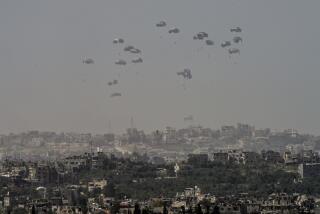Residents of impoverished Gaza Strip turn to Turkey for lifesaving medical care
Nearly two years after shrapnel from a mortar shell hit his family’s Gaza Strip home and wrecked his upper body, Rami Abdusallam can finally move his right arm thanks to a team of Turkish surgeons.
Abdusallam, who is from Rafah, at the southern edge of Gaza, said he had been sleeping in his bedroom when an Israeli shell crashed through the home’s roof.
For the record:
9:09 a.m. July 13, 2016An earlier version of this article stated that about 3,000 patients from the Gaza Strip with life-threatening illnesses apply each month to get treatment at Israeli hospitals, according to the World Health Organization. The figure is about 2,000. It also stated fewer than two-thirds receive security clearance to pass through the Erez crossing. The figure is fewer than three-quarters on average.
“One piece of shrapnel entered my shoulder and came out from my chest, and here another cut open my belly,” he said recently at an apartment in Istanbul’s Fatih district, where he was recovering between surgeries.
The injuries and the lack of adequate medical care available in Gaza, an impoverished seaside territory with about 1.8 million Palestinians, led him to seek help in Turkey, the 26-year-old said.
Abdusallam is among more than 40 Palestinian men from Gaza who are sharing a rented apartment building while undergoing surgery and rehabilitation for injuries related to the ongoing conflict between Israelis and Palestinians. They said they have no ties to the militant group Hamas, which rules Gaza.
The United Nations has said the few hospitals in Gaza are unable to cope with the demands for surgery and rehabilitation. Thousands of people wait long periods for appointments or apply for treatment in countries such as Turkey, Egypt, Israel or Jordan.
The treatment for Abdusallam and others has come as Turkey and Israel have moved to normalize diplomatic relations, while peace talks have been stalled between Israelis and Palestinians.
In late June, Israeli Prime Minister Benjamin Netanyahu and Turkish Prime Minister Binali Yildirim separately announced that restoring ties between the nations, both U.S. allies, would be beneficial to them and result in aid to Gaza.
The agreement, Netanyahu said, included a commitment from Turkey to prevent militant activities by Hamas on its soil. It also calls for help in attempts to return the remains of Israeli soldiers held since the group’s 2014 war with Israel in Gaza. Hamas and others fired thousands of rockets into Israel, which responded by bombarding the strip.
Israel agreed to let Turkey ship building materials for a new hospital and other projects in Gaza, according to the June deal.
Hamas has ruled Gaza since ejecting the secular Palestinian faction Fatah in 2007, and Israel has enforced a blockade of the strip, restricting fuel, construction materials, medicine, food and other essentials for the territory, where the United Nations says nearly 80% of the population is dependent on daily humanitarian aid.
The blockade has meant medicine and equipment for treatments such as chemotherapy and orthopedic surgery are difficult to obtain.
According to the World Health Organization, about 2,000 patients from Gaza with life-threatening illnesses apply each month to get treatment at Israeli hospitals, but fewer than three-quarters on average receive security clearance to pass through the Erez crossing. The strip’s other outlet, the Rafah crossing to Egypt, is even more difficult: Since October 2014, it has been open for a total of 44 days, and of the nearly 10,000 patients seeking treatment in Egypt, about 100 a month have made it through.
“You will die before you get to a hospital,” said Abdusallam, who said an uncle spent three months last year waiting to receive chemotherapy in Cairo for lymphoid cancer.
Denied entry to Erez because he did not pass an Israeli security screening, the uncle bribed Hamas officials to get permission to cross through Rafah.
“He finally got to [a hospital in] Cairo and died within an hour of them putting the needle into his veins,” Abdusallam said.
Since 2014, the Turkish government has run a program to treat patients from Gaza, granting them special diplomatic visas to go to Istanbul and Ankara, the capital. It’s a trickle – only a few hundred people so far – but for patients like Abdusallam who need specialized treatment and cannot get it in Gaza, it’s a life changer.
The program is among several Turkey has been running after relations with Israel soured in 2010, after Israeli commandos killed nine Turkish activists attempting to break the blockade of Gaza. A 10th activist who had been in a coma died in 2014.
Under the June agreement, Israel will pay $20 million to a fund Ankara will set up for the families of the victims and allow more humanitarian aid to be sent to Gaza.
The Mavi Marmara, the ship that carried the activists in 2010, is still docked in the Bosporus strait, draped in a giant Turkish flag, seen by millions who commute from one side of Istanbul to the other each day.
For Abdusallam and many of the other patients from Gaza, the overwhelming feeling is of gratitude for Turkey’s help, even if larger problems persist back home.
“Thank you, Turkey,” Abdusallam said in basic Turkish, which he picked up between four months of surgeries and checkups at a government hospital in Istanbul.
In two more months, he plans to return to Gaza. He said he would like to find work, but the prospects are virtually nonexistent for him and many other young men in Gaza, where the unemployment rate is 43%.
“I have a university degree in banking,” Abdusallam said. “There is no bank in Gaza that will hire me.”
The apartment building’s sitting room is a mess of braces, bandages and crutches, and a television is tuned to Al Aqsa TV, broadcast from the Gaza Strip.
Gaza faces a host of problems, said Ahmed Khaled, 27, a journalist from Gaza City who was injured by shrapnel in 2014 and is undergoing surgery on his right leg and hip that will allow him to walk.
“We have power eight hours a day – on days when Egypt does not cut it off completely from the Sinai,” Khaled said. “We can’t get enough food. Every house has someone martyred or wounded.”
Farooq is a special correspondent.
More to Read
Start your day right
Sign up for Essential California for news, features and recommendations from the L.A. Times and beyond in your inbox six days a week.
You may occasionally receive promotional content from the Los Angeles Times.






